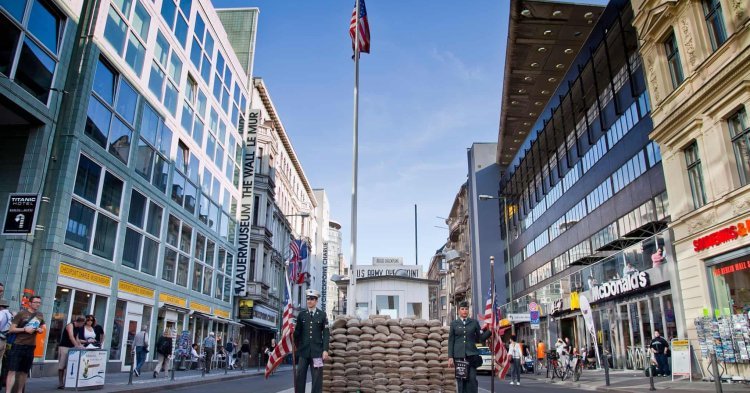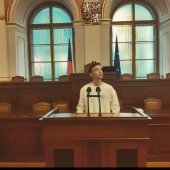Enola Gay, you should have stayed at home yesterday
Aha words can’t describe the feeling and the way you lied …
Enola Gay, is mother proud of little boy today
Aha this kiss you give, it’s never ever gonna fade away...
Ukraine is not a member of NATO, it is not a member state of the European Union, nor is it of great interest, in terms of strategic reserves, to the United States. Moreover it has neither oil nor an American military base on its territory. But other similar situations in the past have not stopped various American presidents from ordering military action in the past. In 1990, George Bush justified an international collision to expel Iraq from Kuwait in defence of the rule of law, against what he called savage rule. In 1995, Bill Clinton intervened militarily in the war that followed the collapse of Yugoslavia. Also in the 1990s, the Americans supported military action to deal with conflicts in the Balkans. In 2003, the United States invaded Iraq again because of the alleged existence of weapons of mass destruction. And Barack Obama unleashed an intervention in Libya’s civil war in 2011 on humanitarian grounds.
If we want to focus on the areas of intervention of the European Union, we can recall that since 2003, it has launched more than 30 international missions under the Common Security and Defence Policy, with 10 civilian missions and 6 military missions or operations currently underway, in the framework of humanitarian aid and evacuation, peacekeeping and crisis management, in Europe, Asia, Africa and the Middle East.
There are therefore no legal or political arguments to justify the West’s inertia and lack of military reaction in support of Ukraine. In the same way, nothing justifies the abusive and illegal invasion, under international law, of Ukraine, which is a sovereign European state and, therefore, autonomous, and independent. The West has begun to react in a timid manner, due to Joe Biden’s non-interventionist approach and the widespread fear in European countries of a Russian nuclear attack using the new cruise missiles and ballistic and hypersonic missiles with nuclear capability that were tested just this month on the border with Ukraine. One can understand the delicacy of the argument, which is worrying. But if this is the case, the Western world as we know needs to beware and the European project needs to demonstrate that it has not lost its momentum.
The European Union has been increasing its support for Ukraine. For the first time, the EU will finance the purchase and delivery of weapons and equipment to a country under attack. This is a watershed moment that will mark Europe’s Foreign Policy in the decades to come, in order to face this new world order that is being defined in the streets of Kiev. President Zelensky’s leadership and his bravery and the resilience of the Ukrainian people have been outstanding and impressive. Surely Putin did not foresee this huge and immediate no-holds-barred union, not only in the West, but all democracies around the world.
As a European, I can only feel great pride in all these measures agreed among the 27. The world unites against a dictator’s delirium, from Japan, Australia and South Korea to Canada and some Latin American countries, and even the ever-neutral Switzerland has joined in the sanctions.
We didn’t start the fire
It was always burning, since the world’s been turning
We didn’t start the fire
No, we didn’t light it, but we tried to fight it...
We are not living in the same Europe as we did a week ago. The images and the words will weigh on the Western conscience. Five days before the military invasion of Russia beginning on 24 February 2022, at the Security Conference in Munich, the President of Ukraine was asking for honest answers about the prospects of EU and NATO membership. The Ukrainians made their choice a few years ago to move closer to the West, but since 2014, the Russian Federation has been convinced that they chose the wrong path and that it is not easy for anyone to join NATO or the EU.
I cannot forecast to you the action of Russia. it is a riddle wrapped inside a mystery inside an enigma.
Sir Winston Churchill, October 1939
It is also well known that because of its symbolism and importance in Russian history and politics, Ukraine is associated with the historical embryo of the Russian state (the medieval principality of Kiev) and the rise of Russia as a European power. This makes the geopolitical issue a very delicate one. Beyond this history and symbolism, the geopolitical dimension linked to borders is another problem. The western borders with Poland, Slovakia, Hungary, and Romania were already international borders before the end of the USSR. But Ukraine’s borders with Belarus, Moldova and Russia were internal administrative divisions of the former Soviet Union.
Information of a possible Russian military invasion emerged, and the West moved into a phase of policy of deterrence, with constant public dissemination of information normally reserved for state and military means. In late January, NATO’s top leader Jans Stoltenberg made it clear that there would be no plans to deploy NATO troops in Ukraine in the event of a Russian invasion.
Putin has only one logic: the adversary is weak, he advances. The adversary is strong, he waits. He rarely retreats. He measures weakness, and when he senses it, he advances mercilessly. He is trying to shred Ukraine and his dream is to be the longest Russian or Soviet leader in power. He has already overtaken Leonid Brejnev, The Last Tsar, Nicholas II of Russia, and, according to constitutional changes, he will be in power until 2036, overtaking Stalin in a few years.
Regimes planted by bayonets do not take root.
Ronald Reagan, June 1982
When Putin came to power, he came with a desire to break away from the rapprochement with the West that was, in his view, of little benefit to Russia. Although it has maintained frameworks of cooperation with Western countries, it has gradually begun, in various dimensions, to be less cooperative. The Russian leader wants NATO to pull back. Since he can’t achieve that, he advances through Ukraine and Belarus. Over the last few years, he has shredded two Georgian territories, gone to Donbass, Crimea and even carried out operations in Azerbaijan, Tajikistan, and Kazakhstan.
Putin is trying to intellectualise the barbarity he is carrying out by repeating several times the idea of “one people” and other completely staple excuses and justifications. Curiously, Putin never mentions the great famine in Ukraine caused by Stalin, who “Russified” the country and collectivised the lands of an immensely complex and vast territory.
The attitude of the West and of Russia towards a crisis like Ukraine is diametrically different. The West is trying to establish the legality of any established border. For Russia, Ukraine is part of the Russian patrimony.
Henry Kissinger
This week also saw the end of Belarus’s neutrality status. In December, Lukashenko said: I give Putin the right to install nuclear weapons in Belarus. The European Union is once again seeing nuclear devices deployed on its doorstep.
But the problem is not in lying, it is in believing. Before Crimea, Russia’s biggest partner was the Netherlands - port of Rotterdam, commercial centre of Europe. After the annexation, it became China. The West did not want to see it and now deals with the consequences as it can.
Among many others, three immediate consequences arise from this criminal action by Russia’s top leader. On the one hand, Putin seems to have given NATO a new lease of life. For another, Putin thought he was subduing Germany through gas, but in the end, it has led to a reshaping of the country’s foreign policy, and one wonders at the courage of the European Union’s largest economy. The German Chancellor has announced that Germany will massively increase its defence spending. For the time being, it will create a unique “special fund” of 100 billion euros and, from now on, will invest more than 2% of annual gross domestic product (GDP) in defence.
For Olaf Scholz, another major challenge is to prevent Putin’s war from spreading to other countries in Europe. This means that, with no ifs and buts, Germany will maintain its duty of support in NATO. Every square metre of Alliance territory will be defended by all member states and Scholz made that clear to Putin. Germany, which has already agreed to exclude Russia from the SWIFT system, is admitting even more sanctions against Moscow and has decided to ban all Russian aircrafts from its airspace as early as this Sunday.
On the other hand, Putin sees his relationship with Erdogan change radically. As a member of NATO, the Ankara government has already warned the Kremlin this Wednesday that Turkey will never recognise any measure that affects the sovereignty and territorial integrity of Ukraine.
The conflict has advanced at a breakneck pace, but the spirit of European solidarity with Ukraine brings some hope for these dark hours ahead. Hungary, Austria, and Poland, who in 2016 were against taking in refugees, have shown themselves open to welcoming Ukrainian war victims. There has been an awakening of a European conscience after a serious threat to the entire security of the Old Continent.
There is nothing more difficult than saying goodbye to a home where one has suffered, and European peoples are once again ravaged by a devastating war perpetrated by the delirium of a dictator. European cities wake to the sound of sirens once more and violent explosions claim lives in the heart of Europe.
Never think that war, no matter how necessary, nor how justified, is not a crime – Ernest Hemingway


Follow the comments: |
|
